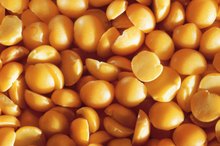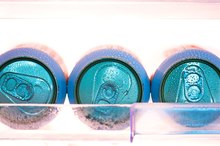The Side Effects of Folic Acid Intolerance
Folic acid, or vitamin B-9, is one of the water-soluble B-complex vitamins that is essential for numerous body functions, including DNA replication and repair as well as cell division and growth. Although folic acid is considered an essential part of your diet and is found in many foods such as flour, grains, rice and pasta, some individuals have an intolerance, or allergy, to folic acid. If you have a folic acid allergy, you are advised to stay away from foods containing high amounts of folic acid and folate in order to help minimize the symptoms of an allergy.
Causes of Folic Acid Intolerance
Allergic reactions to folic acid are caused by the inability of your immune system to decipher what folic acid really is when it is introduced to your body. Instead of allowing your immune system to digest and absorb folic acid, your immune system will fight against it, identifying folic acid as a harmful threat to your body instead of a helpful vitamin. Your immune system will react to folic acid by producing antibodies and histamine that may cause symptoms similar to the common allergy. Even if only minor symptoms occur, you may be at greater risk for a more serious allergic reaction to folic acid.
- Allergic reactions to folic acid are caused by the inability of your immune system to decipher what folic acid really is when it is introduced to your body.
Drug Interactions and Folic Acid Allergy
Hydrogenated Soybean Oil Allergies
Learn More
Even if you are not normally intolerant to any vitamins, a folic acid allergy may occur when it is ingested in combination with certain drugs and medications. Folic acid may decrease the effectiveness of some cancer drugs, because these drugs are meant to inhibit cellular reproduction while folic acid promotes it. Folic acid may also affect the effectiveness of drugs to treat neurological disorders such as schizophrenia and psychosis due to a disruption in the release of neurotransmitters in your brain. If you are on certain cancer and anti-psychotic medications, you may also increase the risk of developing an allergy to folic acid.
- Even if you are not normally intolerant to any vitamins, a folic acid allergy may occur when it is ingested in combination with certain drugs and medications.
Symptoms of an Allergic Reaction
An allergic reaction to folic acid typically affects your skin, lungs, sinuses and intestinal tract. You may develop skin rashes or hives, as well as irritation and redness of your skin as a result of an allergic reaction to folic acid. Respiratory effects include coughing, wheezing, difficulty breathing and a tightness in your chest. Your sinuses may feel excess pressure and nasal congestion, and your digestive system may experience nausea, bloating, gas and diarrhea as a result of folic acid intolerance. Consult your physician if you experience any of these symptoms to determine whether folic acid is causing them or if another substance is involved.
- An allergic reaction to folic acid typically affects your skin, lungs, sinuses and intestinal tract.
- Your sinuses may feel excess pressure and nasal congestion, and your digestive system may experience nausea, bloating, gas and diarrhea as a result of folic acid intolerance.
Folic Acid Intolerance Considerations
Histamine Effects of Drinking Wine
Learn More
Since folic acid intolerance manifests itself as a generic allergic reaction in most cases, it may be easily mistaken for a host of other common allergies. Some foods that naturally contain folic acid may also contain other nutrients that can be highly allergic, therefore your symptoms may not necessarily be the result of folic acid intolerance, but rather an allergy to a different nutrient contained within the food. Proteins found in shellfish, meat, grains and certain vegetables may be the root cause of your allergy, and not folic acid. Consult your physician for an allergy test to determine which nutrient is actually causing your allergic reaction.
- Since folic acid intolerance manifests itself as a generic allergic reaction in most cases, it may be easily mistaken for a host of other common allergies.
- Some foods that naturally contain folic acid may also contain other nutrients that can be highly allergic, therefore your symptoms may not necessarily be the result of folic acid intolerance, but rather an allergy to a different nutrient contained within the food.
Related Articles
References
- "Nutrition for Health, Fitness, and Sport"; Melvin H. Williams; 2002
- "The New Encyclopedia of Vitamins, Minerals, Supplements, and Herbs"; Nicola Reavley; 1999
- Hariz A, Bhattacharya PT. Megaloblastic Anemia. [Updated 2019 Jan 23]. In: StatPearls [Internet]. Treasure Island (FL): StatPearls Publishing; 2019 Jan-. Available from: https://www.ncbi.nlm.nih.gov/books/NBK537254/
- Donnelly JG. Folic acid. Crit Rev Clin Lab Sci. 2001;38(3):183-223.
- Scaglione F, Panzavolta G. Folate, folic acid and 5-methyltetrahydrofolate are not the same thing. Xenobiotica. 2014;44(5):480-8.
- Figueiredo JC, Grau MV, Haile RW, et al. Folic acid and risk of prostate cancer: results from a randomized clinical trial. J Natl Cancer Inst. 2009;101(6):432–435. doi:10.1093/jnci/djp019
- Spina bifida and anencephaly before and after folic acid mandate--United States, 1995-1996 and 1999-2000. MMWR Morb Mortal Wkly Rep. 2004;53(17):362-5.
- Bastian H. Lucy Wills (1888-1964): the life and research of an adventurous independent woman. J R Coll Physicians Edinb. 2008;38(1):89-91.
- Visentin M, Zhao R, Goldman ID. The antifolates. Hematol Oncol Clin North Am. 2012;26(3):629–ix. doi:10.1016/j.hoc.2012.02.002
- Greenberg JA, Bell SJ, Guan Y, Yu YH. Folic Acid supplementation and pregnancy: more than just neural tube defect prevention. Rev Obstet Gynecol. 2011;4(2):52–59.
- Northrup H, Volcik KA. Spina bifida and other neural tube defects. Curr Probl Pediatr. 2000;30(10):313-32.
- Crider KS, Bailey LB, Berry RJ. Folic acid food fortification-its history, effect, concerns, and future directions. Nutrients. 2011;3(3):370–384. doi:10.3390/nu3030370
- Fousekis FS, Theopistos VI, Katsanos KH, Tsianos EV, Christodoulou DK. Hepatobiliary Manifestations and Complications in Inflammatory Bowel Disease: A Review. Gastroenterology Res. 2018;11(2):83–94. doi:10.14740/gr990w
- Hariz A, Bhattacharya PT. Megaloblastic Anemia. [Updated 2019 Jan 23]. In: StatPearls [Internet]. Treasure Island (FL): StatPearls Publishing; 2019 Jan-.
- Maron BA, Loscalzo J. The treatment of hyperhomocysteinemia. Annu Rev Med. 2009;60:39–54. doi:10.1146/annurev.med.60.041807.123308
- Tinelli C, Di Pino A, Ficulle E, Marcelli S, Feligioni M. Hyperhomocysteinemia as a Risk Factor and Potential Nutraceutical Target for Certain Pathologies. Front Nutr. 2019;6:49. Published 2019 Apr 24. doi:10.3389/fnut.2019.00049
- Juhlin L, Olsson MJ. Improvement of vitiligo after oral treatment with vitamin B12 and folic acid and the importance of sun exposure. Acta Derm Venereol. 1997;77(6):460-2.
- Merle BM, Silver RE, Rosner B, Seddon JM. Dietary folate, B vitamins, genetic susceptibility and progression to advanced nonexudative age-related macular degeneration with geographic atrophy: a prospective cohort study. Am J Clin Nutr. 2016;103(4):1135-44.
- Tian T, Yang KQ, Cui JG, Zhou LL, Zhou XL. Folic Acid Supplementation for Stroke Prevention in Patients With Cardiovascular Disease. Am J Med Sci. 2017;354(4):379-387.
- Hsu CY, Chiu SW, Hong KS, et al. Folic Acid in Stroke Prevention in Countries without Mandatory Folic Acid Food Fortification: A Meta-Analysis of Randomized Controlled Trials. J Stroke. 2018;20(1):99–109. doi:10.5853/jos.2017.01522
- McRae MP. High-dose folic acid supplementation effects on endothelial function and blood pressure in hypertensive patients: a meta-analysis of randomized controlled clinical trials. J Chiropr Med. 2009;8(1):15–24. doi:10.1016/j.jcm.2008.09.001
- Zhao G, Ford ES, Li C, Greenlund KJ, Croft JB, Balluz LS. Use of folic acid and vitamin supplementation among adults with depression and anxiety: a cross-sectional, population-based survey. Nutr J. 2011;10:102.
- Gisondi P, Fantuzzi F, Malerba M, Girolomoni G. Folic acid in general medicine and dermatology. J Dermatolog Treat. 2007;18(3):138-46.
- Reynolds EH. Folic acid, ageing, depression, and dementia. BMJ. 2002;324(7352):1512–1515. doi:10.1136/bmj.324.7352.1512
- Nucera E, Aruanno A, Mezzacappa S, Pascolini L, Buonomo A, Schiavino D. Hypersensitivity reactions to folic acid: Three case reports and a review of the literature. Int J Immunopathol Pharmacol. 2018;32:2058738418817704. Published 2018 Dec 17. doi:10.1177/2058738418817704
- Pieroth R, Paver S, Day S, Lammersfeld C. Folate and Its Impact on Cancer Risk. Curr Nutr Rep. 2018;7(3):70–84. doi:10.1007/s13668-018-0237-y
- Lewis DP, Van dyke DC, Willhite LA, Stumbo PJ, Berg MJ. Phenytoin-folic acid interaction. Ann Pharmacother. 1995;29(7-8):726-35.
- Selhub J, Dhar GJ, Rosenberg IH. Inhibition of folate enzymes by sulfasalazine. J Clin Invest. 1978;61(1):221-4.
- Kennedy DO. B Vitamins and the Brain: Mechanisms, Dose and Efficacy--A Review. Nutrients. 2016;8(2):68. Published 2016 Jan 27. doi:10.3390/nu8020068
- Starr RR. Too little, too late: ineffective regulation of dietary supplements in the United States. Am J Public Health. 2015;105(3):478–485. doi:10.2105/AJPH.2014.302348
- Troesch B, Demmelmair J, Gimpfl M, et al. Suitability and safety of L-5-methyltetrahydrofolate as a folate source in infant formula: A randomized-controlled trial. PLoS One. 2019;14(8):e0216790. Published 2019 Aug 19. doi:10.1371/journal.pone.0216790
- Pintó X, Vilaseca MA, Balcells S, et al. A folate-rich diet is as effective as folic acid from supplements in decreasing plasma homocysteine concentrations. Int J Med Sci. 2005;2(2):58–63. doi:10.7150/ijms.2.58
- American Academy of Pediatrics: Committee on Genetics. Folic acid for the prevention of neural tube defects. Pediatrics. 1999 Aug;104(2 Pt 1):325-7.
- Juhlin, L. and Olsson, M. Improvement of vitiligo after oral treatment with vitamin B12 and folic acid and the importance of sun exposure. Acta Derm Venereol. 1997 Nov;77(6):460-2. DOI: 10.2340/000155555577460462.
- Li, Y.; Huang, T.; Zheng, Y. et al. Folic Acid Supplementation and the Risk of Cardiovascular Diseases: A Meta‐Analysis of Randomized Controlled Trials. JAHA. 2016;5(8):pii: e003768. DOI: 10.1161/JAHA.116.003768.
- Merle, B.; Silver, R.; Rosner, B. et al. Dietary folate, B vitamins, genetic susceptibility and progression to advanced nonexudative age-related macular degeneration with geographic atrophy: a prospective cohort study. Am J Clin Nutr. 2016 Apr;103(4):1135-44. DOI: 10.3945/ajcn.115.117606.
- Zhao, G.; Ford, E.; Li, C. et al. Use of folic acid and vitamin supplementation among adults with depression and anxiety: a cross-sectional, population-based survey. Nutrition Journal. 2011;10:102. DOI: 10.1186/1475-2891-10-102.
Writer Bio
Joe King began writing fitness and nutrition articles in 2001 for the "Journal of Hyperplasia Research" and Champion Nutrition. As a personal trainer, he has been helping clients reach their fitness goals for more than a decade. King holds a Bachelor of Science in kinesiology from California State University, Hayward, and a Master of Science in exercise physiology from California State University, East Bay.









